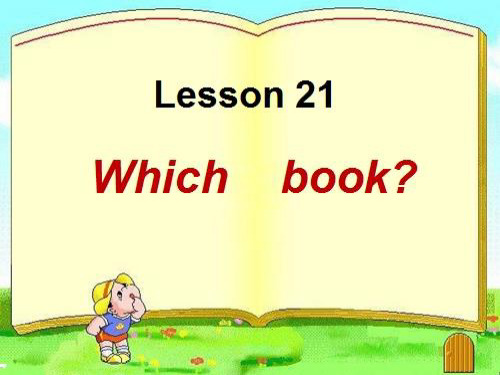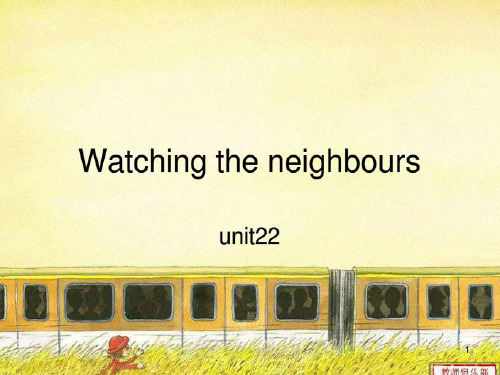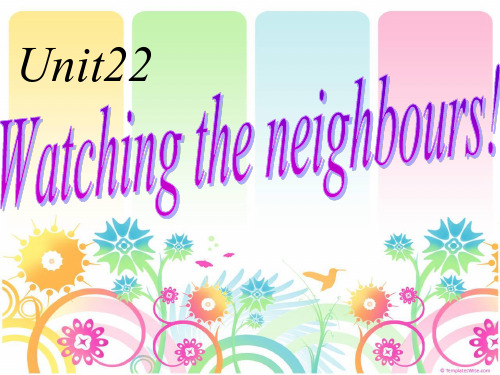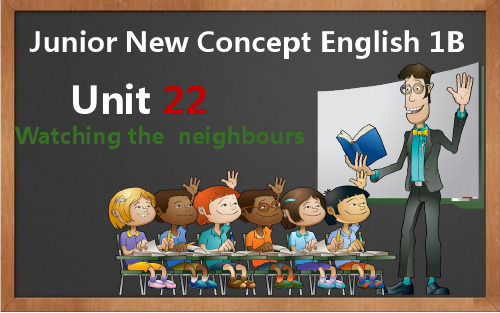青少版新概念1B Unit22课件全面.ppt
合集下载
新概念英语第一册lesson2122(共65张PPT)

谓语:
说明主语“是什么”或“怎么样”。 谓语必须用动词。谓语和主语在人 称和数上必须一致。
谓语在主语后面。 I like Tank.
找出谓语
1.He studies English at school. 2. I go to work in the morning. 3. She speaks French. 4. Kelly reads books every day. 5. Jojo cleans the house every day. 6.We like Michelle and GiGi. 7.I have a young father. 8. We listen to Michelle in class.
sharp-blunt
His Our His
Their
1.Give me a cup. 2.Pass me a bottle. 3.Show me a box.
4. Tell me a story.
give v. 给
give up 放弃 give in 屈服 give a talk 作一次演讲
15、一年之计,莫如树谷;十年之计 ,莫如 树木; 终身之 计,莫 如树人 。2021年8月2021/8/112021/8/112021/8/118/11/2021
16、提出一个问题往往比解决一个更 重要。 因为解 决问题 也许仅 是一个 数学上 或实验 上的技 能而已 ,而提 出新的 问题, 却需要 有创造 性的想 像力, 而且标 志着科 学的真 正进步 。2021/8/112021/8/11August 11, 2021
动词之后人称代词用宾格
单数 (宾格)
一
me
我
复数 (宾格)
青少版新概念1B Unit 22(ppt课件)

她有许多咖啡 She has got a lot of coffee. She has got lots of coffee. She has got much coffee.
学习交流课件
13
How many---?
How many+可数名词复数+ has/have+人+got?
询问某人具有某样可数东西的数量 保罗有多少CD呢?
CD CD光盘 video 录像带 DVD DVD光盘 blouse女士衬衫 jacket 夹克衫 skirt 裙子 magazine 杂志 vegetable 蔬菜
relative 亲戚
学习交流课件
6
Have got
• Have got 有,可使用
• Haven’t got 没有
• Have you got 有……吗?
How many CDs has Paul got? 他有(没有)很多CD
He has got lots of CDs.
He hasn’t got many CDs.
学习交流课件
14
How much---?
How much+不可数名词+ has/have+ 人+got?
询问某人具有某样不可数东西的多少
• 我们有一些苹果汁。
• We have got some apple juice.
• 我们有橙汁吗?
• Have we got any orange juice?
• 我们没有橙汁。
• We haven’t got any orange juice.
学习交流课件
7
have got (我,我们,你,你们,他们,它们,
青少版新概念1B_unit22(共21页)

他没有很多鸡蛋
He has not got lots of eggs. He hasn’t got lots of eggs.
他有很多鸡蛋吗?
Has he got many eggs?
a lot of, lots of, many与 much
a lot of = lots of 很多,后可接可数名词 与不可数名词
many 很多,后接可数名词复数 much 很多,后接不可数名词
他有很多书 He has got a lot of books. He has got lots of books. He has got many books.
她有很多CD She has got a lot of CDs. She has got lots of CDs. She has got many CDs.
如: boy, book, family等都是可数名词。
不可数名词
不可数名词主要包括两大类:物质名 词与抽象名词。物质名词表示无法为个体 的实物,如:食物、水、金属等,例如: rice, coffe, meat, bread, water, tea.抽象名 词为动作、状态、品质等无法计数的抽象 概念,例如:advice, knowledge, shame, heat.
Unit 22 Watching the neighbours
Lesson 43 Lesson 44
New Words and Expressions
breakfast blues 早餐忧郁How much? 多少---?
do 助动词
pot 壶
want 想要
start 开始
not really 不完全是,不太 morning 早晨
He has not got lots of eggs. He hasn’t got lots of eggs.
他有很多鸡蛋吗?
Has he got many eggs?
a lot of, lots of, many与 much
a lot of = lots of 很多,后可接可数名词 与不可数名词
many 很多,后接可数名词复数 much 很多,后接不可数名词
他有很多书 He has got a lot of books. He has got lots of books. He has got many books.
她有很多CD She has got a lot of CDs. She has got lots of CDs. She has got many CDs.
如: boy, book, family等都是可数名词。
不可数名词
不可数名词主要包括两大类:物质名 词与抽象名词。物质名词表示无法为个体 的实物,如:食物、水、金属等,例如: rice, coffe, meat, bread, water, tea.抽象名 词为动作、状态、品质等无法计数的抽象 概念,例如:advice, knowledge, shame, heat.
Unit 22 Watching the neighbours
Lesson 43 Lesson 44
New Words and Expressions
breakfast blues 早餐忧郁How much? 多少---?
do 助动词
pot 壶
want 想要
start 开始
not really 不完全是,不太 morning 早晨
青少版新概念1B_unit22精品课件(共53页)

23
Is Claire busy? Is Paul busy?
Who are both busy?
Has Claire/ Paul got lots of spare time?
24
Who are they talking about? Who is Daisy?
25
听力理解
26
Listen to the recording, and then answer the question:
shy. Perhaps she hasn’t got many friends.
50
Polly: Well, there are lots of nice girls at the art college.
51
Homework
• 1. 新单词5英1汉 • 变一般疑问句,并做肯定和否定回答 • He has got lots of friends. • 2. 背诵课文1,2,3段 • 3.背诵笔记 • 4.预习右半部分课文。
41
做肯定和否定回答
• 1. Has Paul got any cake? • 肯定.回答; • Yes, he has. • 否定回答; • No, he hasn’t • 2. Has Claire got any food? • Yes, she has. No, she hasn’t.
42
27
Listen and fill in the blanks.
28
Polly: There’s Claire in Karen’s garden. Look, she’s with Paul again.
Annie: Yes, they’re very good friends.
Is Claire busy? Is Paul busy?
Who are both busy?
Has Claire/ Paul got lots of spare time?
24
Who are they talking about? Who is Daisy?
25
听力理解
26
Listen to the recording, and then answer the question:
shy. Perhaps she hasn’t got many friends.
50
Polly: Well, there are lots of nice girls at the art college.
51
Homework
• 1. 新单词5英1汉 • 变一般疑问句,并做肯定和否定回答 • He has got lots of friends. • 2. 背诵课文1,2,3段 • 3.背诵笔记 • 4.预习右半部分课文。
41
做肯定和否定回答
• 1. Has Paul got any cake? • 肯定.回答; • Yes, he has. • 否定回答; • No, he hasn’t • 2. Has Claire got any food? • Yes, she has. No, she hasn’t.
42
27
Listen and fill in the blanks.
28
Polly: There’s Claire in Karen’s garden. Look, she’s with Paul again.
Annie: Yes, they’re very good friends.
青少版新概念1B_unit22(共25页)

PRACTICE
Has Paul got any apples? (同义句) Does Paul have any apples?
Has Robert got lots of shirts? (同义句) Does Robert have lots of shirts?
Have you got many books? (同义句) Do you have many books?
Annie: And they’re both very busy with their studies. They haven’t got a lot of spare time.
Polly: That’s true. Paul’s always busy. Now tell me about Claire’s mother…
真实的
always
总是
NEW WORDS AND EXPRESSIONS
a lot of a lot of = lots of 修饰名词,既可以是可数名词复数,也可以是
不可数名词 some也可以修饰名词,既可以是可数名词复
数,也可以是不可数名词,用于肯定居中 在否定和疑问句中用any
通常放在动词短语的最后。 在一般的陈述句中复数名词前面不加冠词,其
单数形式是a very good friend(一类中的一 个)。
LISTENING AND UNDERSTANDING
Polly: Has she got a lot of friends now, Annie?
Annie: Well, she’s very new here. And she’s shy. Perhaps she hasn’t got many friends.
青少版新概念 1B Unit22,2

• • • • •
二. 变为否定句 1. He has got many friends. He hasn’t got many friends. 2. Paul has got lots of books. Paul hasn’t got lots of books.
重点提炼
• • • • • 1.introduce A to B 向B介绍A 2. be busy with sth./ (in) doing sth. 忙于做某事 3. spare time 业余时间 4. tell me about…告诉我关于…
1.introduce A to B 向B介绍A (A, B如果是 代词,要用代词宾格。)
• • • • • •
They’re both very busy with their studies. 他们俩都很忙于自己的学习。 I’m very busy with my homework(作业). My mother is busy with her housework(家务). He is busy in cooking dinner. Robert is busy chopping an onion.
新概念课文教学课件标准流程
• • • •
• • • • • •
1 热身活动( 复习) 2课文导入 3 生词学习 4 听力理解( 1 Picture talking 2 Listen and answer 3 Listen and fill in the blanks) 5 句子学习 6 篇章学习 7 情景再现 8 重点提炼 9 巩固练习 10 作业
Answer the questions
1. Has Paul got a lot of friends? Yes, he has. 2. Who is happy with Paul? Claire is. 3. Is Paul a lovely young man? Yes, he is. 4. Have Paul and Claire have lots of spare time? No, they haven’t. 5. Who is always busy? Paul is.
新概念英语第一册第2122课ppt课件

为深入学习习近平新时代中国特色社 会主义 思想和 党的十 九大精 神,贯彻 全国教 育大会 精神,充 分发挥 中小学 图书室 育人功 能
some any练习
• 1.Ann has __ apples. • some • 2.Bill doesn't have __ plums. • any • 3.Would you like __ milk? • some • 4.Is there __ jam in the fridge? • any
为深入学习习近平新时代中国特色社 会主义 思想和 党的十 九大精 神,贯彻 全国教 育大会 精神,充 分发挥 中小学 图书室 育人功 能
• There • are • There • is • There • is • There • are
there be 练习
two boys and a girl. a girl and two boys. some milk and three bananas. three bananas and some milk.
• 8. His face │turned │red.
他的脸红了。
• There be 结构: There be 表示‘存在有’。这里的there没有实际意义,不可与副 词‘there那里’混淆。
• 此结构后跟名词,表示‘(存在)有某事物’
• 试比较:There is a boy there.(那儿有一个男孩。)/前一个there无实意,后一个 there为副词‘那里’。
•
基本句型 为深入学习习近平新时代中国特色社会主义思想和党的十九大精神,贯彻全国教育大会精神,充分发挥中小学图书室育人功能
一:S
V
(主+谓)
新概念英语青少版1B_Unit22

both两者都,all三 者或三者以上,放 be后动前。 be busy with忙于做… busy---free
studies:名词,”学习,研究“
They’re both very busy with their studies. They haven’t got a lot of spare time. 空闲时间
New Words and Expressions
breakfast blues 早餐忧郁How much? 多少---?
do
助动词
pot
壶
want 想要
something 某事,某物 train
训练 胃
start
开始
not really 不完全是,不太 morning 早晨 yoghurt canteen terrible
Key points:
There be句型和have\has…got的区别:
There be句型表示 “存在有” have\has表示 “拥有” “所有”,
桌子上有三本书.
There are three books on the desk.
我有三本书.
I have got three books.
1. There isn’t _____water in the glass. Let’s go and get some. A. many B. lots C. any D. some 2. ---There ___a lot of meat on the plate. Would you like some? ---Just a little, please.A. is B. are C. am D. be 3. There _______ some books, a pen and a ruler on the desk. A. is B. are C. have D. has 4. There _____ a pen, a ruler and some books on the desk. A. is B. are C. have D. has 5. ---_______is in the house? --- There is an old woman in the house. A. What B. Whose C. Who D. Which
青少版新概念英语1bunit22

How much---?
How much+不可数名词+ has/have+人 +got?
询问某人具有某样不可数东西的多少 保罗有多少面包呢?
How much bread has Paul got? 他有(没有)很多面包 He has got lots of bread. He hasn’t got much bread.
e.g. 1) There are a lot of balls on Minny's desk.=There are many balls on Minny's desk. 2) I have got a lot of spare time.=I have got much spare time.
他有很多书 He has got a lot of books. He has got lots of books. He has got many books.
她有很多CD She has got a lot of CDs. She has got lots of CDs. She has got many CDs.
如: boy, book, family等都是可数名
词。
不可数名词
不可数名词主要包括两大类: 物质名词与抽象名词。物质名词表示无法 为个体的实物,如:食物、水、金属等, 例如:rice, coffe, meat, bread, water, tea.抽象名词为动作、状态、品质等无法 计数的抽象概念,例如:advice, knowledge,heat.
5 got?
CDs.
A: How many DVDs has Paul
B: Not many. A: What about CDs? B: Oh, he’s got lots of
新概念英语青少年版1B_unit22双数课(共18页).

(2) 句型转换 • A :否定句:在have或has后加not, 缩写为
haven’t或hasn’t. 1) I have got three sisters. → I haven't got three sisters. 2) He has got a bike. → He hasn't got a bike.
have got / has got 的定义及用法
• B :一般疑问句:把Have或Has提前到句首 1) I have got three sisters. → Have you got three sisters? Yes, I have./ No, I haven't. 2) He has got a bike. → Has he got a bike? Yes, he has./No, he hasn't.
Have got
• Have got 有,可使用 • Haven’t got 没有 • Have you got 有……吗? • 我们有一些苹果汁。 • We have got some apple juice. • 我们有橙汁吗? • Have we got any orange juice? • 我们没有橙汁。 • We haven’t got some orange juice.
• How many books has Paul got?
• Lots • How many CDs has
he got?ቤተ መጻሕፍቲ ባይዱ• Not many
What do you want for lunch ?
I want some cakes and some juice .
我们有多少? How much have we got ? 我们有多少果汁? How much juice have we got ? 我们有多少块蛋糕? How many cakes have we got ?
haven’t或hasn’t. 1) I have got three sisters. → I haven't got three sisters. 2) He has got a bike. → He hasn't got a bike.
have got / has got 的定义及用法
• B :一般疑问句:把Have或Has提前到句首 1) I have got three sisters. → Have you got three sisters? Yes, I have./ No, I haven't. 2) He has got a bike. → Has he got a bike? Yes, he has./No, he hasn't.
Have got
• Have got 有,可使用 • Haven’t got 没有 • Have you got 有……吗? • 我们有一些苹果汁。 • We have got some apple juice. • 我们有橙汁吗? • Have we got any orange juice? • 我们没有橙汁。 • We haven’t got some orange juice.
• How many books has Paul got?
• Lots • How many CDs has
he got?ቤተ መጻሕፍቲ ባይዱ• Not many
What do you want for lunch ?
I want some cakes and some juice .
我们有多少? How much have we got ? 我们有多少果汁? How much juice have we got ? 我们有多少块蛋糕? How many cakes have we got ?
青少版新概念英语1B全单元课件_unit22(共23页).ppt

/’stʌdI/ study
Clair Paul Karen’s garden
There’s Clair in Karen’s garden.
Key points:
1) There be 句型 (Make sentences)
2) with 和…在一起
Part 1 Claire and her good friend, Paul are in the Karen’s garden.
A. is B. are C. have D. has 4. There _______ a pen, a ruler and some books on the desk.
A. is B. are C. have D. has 5. ---_______is in the house? --- There is an old women in the house. A. What B. Whose C. Who D. Which
2. ---There _______a lot of meat on the plate. Would you like some? ---Just a little, please.
A. is B. are C. am D. be 3. There _______ some books, a pen and a ruler on the desk.
Unit22
Warming up:Let’s PK
可数名词
boy、girl、friend、CD、book shirt、jacket、flower、vegetable、 hat、dress
不可数名词
water、rice、tea、milk、coffee bread、meat
Clair Paul Karen’s garden
There’s Clair in Karen’s garden.
Key points:
1) There be 句型 (Make sentences)
2) with 和…在一起
Part 1 Claire and her good friend, Paul are in the Karen’s garden.
A. is B. are C. have D. has 4. There _______ a pen, a ruler and some books on the desk.
A. is B. are C. have D. has 5. ---_______is in the house? --- There is an old women in the house. A. What B. Whose C. Who D. Which
2. ---There _______a lot of meat on the plate. Would you like some? ---Just a little, please.
A. is B. are C. am D. be 3. There _______ some books, a pen and a ruler on the desk.
Unit22
Warming up:Let’s PK
可数名词
boy、girl、friend、CD、book shirt、jacket、flower、vegetable、 hat、dress
不可数名词
water、rice、tea、milk、coffee bread、meat
新概念1B Unit22

Paul: No, thanks. Have we got any tea?
Karen: Yes, there’s some tea in the pot.
Help yourself.
18
我是这方面的专家。 请相信我。
Karen: Poor Paul! It’s a very early start! Paul: Tell me about it! I can’t eat at six o’cloc in the morning.
2.Paul and Claire are good friends. It’s _t_r_u_e___ -they’re very good friends. 3.Can you _in_t_ro__d_u_c_e me to your new friend?
–Yes, of course. This is Peter.
fr_ _t ch_c_l_t_
b_ _r p_p_r str_ng m_n_y t_rr_bl_
礼貌表示拒绝的习惯用语。
Paul: Not really, but I must eat something. I mustn’t train on an empty stomach. Have we got any orange juice?
He’s a _l_o_ve_l_y_ __y_o_u_n_g_ man.
67
ANNIE: And they’re both very _b_u_s_y_ with
their _s_t_u_d_i_e_s_. They _h_a_v_e_n_’t_ got a lot of
_s_p_a_r_e_ time.
03 New words
- 1、下载文档前请自行甄别文档内容的完整性,平台不提供额外的编辑、内容补充、找答案等附加服务。
- 2、"仅部分预览"的文档,不可在线预览部分如存在完整性等问题,可反馈申请退款(可完整预览的文档不适用该条件!)。
- 3、如文档侵犯您的权益,请联系客服反馈,我们会尽快为您处理(人工客服工作时间:9:00-18:30)。
课件
他有许多面包 He has got a lot of bread. He has got lots of bread. He has got much bread.
她有许多咖啡 She has got a lot of coffee. She has got lots of coffee. She has got much coffee.
课件
How much---?
How much+不可数名词+ has/have+ 人+got?
询问某人具有某样不可数东西的多少 保罗有多少面包呢? How much bread has Paul got? 他有(没有)很多面包 He has got lots of bread. He hasn’t got much bread.
课件
课件
How many---?
How many+可数名词复数+ has/have+人+got?
询问某人具有某样可数东西的数量 保罗有多少CD呢? How many CDs has Paul got? 他有(没有)很多CD He has got lots of CDs. He hasn’t got many CDs.
He has got lots of eggs.
他没有很多鸡蛋
He has not got lots of eggs. He hasn’t got lots of eggs.
他有很多鸡蛋吗?
Has he got many eggs?
课件
a lot of, lots of, many与 much
a lot of = lots of 很多,后可接可数名词 与不可数名词
课件
Unit 22 Watching the neighbours Lesson 43 Lesson 44
课件
课件
New Words and Expressions
breakfast blues 早餐忧郁How much? 多少---?
do 助动词
pot 壶
want 想要
start 开始
not really 不完全是,不太 morning 早晨
课件
have got (我,我们,你,你们,他们,它们,
她们) 有
has got (他,她,它) 有 我们有很多鸡蛋 We have got lots of eggs. We’ve got lots of eggs. 我们有酸奶吗? Have we got any yoghurt?
课件
他有很多鸡蛋
如: boy, book, family等都是可数名词。
课件
不可数名词
不可数名词主要包括两大类:物质名 词与抽象名词。物质名词表示无法为个体 的实物,如:食物、水、金属等,例如: rice, coffe, meat, bread, water, tea.抽象名 词为动作、状态、品质等无法计数的抽象 概念,例如:advice, knowledge, shame, heat.
many 很多,后接可数名词复数 much 很多,后接不可数名词
课件
他有很多书 He has got a lot of books. He has got lots of books. He has got many books.
她有很多CD She has got a lot of CDs. She has got lots of CDs. She has got many CDs.
课件
5 A: How many DVDs has Paul got? B: Not many. A: What about CDs? B: Oh, he’s got lots of CDs.
课件
名词可分为可数名词和不可数名词。可数 名词有单复数之分,前面可加数词或冠词。
可数名词包括: (1) 普通名词; (2) 集体名词; (3) 少数专有名词。
something 某事,某物 yoghurt 酸奶
train 训练
canteen 餐厅
stomach 胃
terrible 极坏的,可怕的
have got 有
课件
课件
New Words and Expressions
a lot of 很多
to 向
shy 害羞的
studies 学习,研究
many 很多
relative 亲戚
课件
Pattern Practice
1 A: Paul has got some CDs. B: He’s got some DVDs , too.
3 A: Has Paul got any DVDs ? B: Yes, he has , and he’s got lots of CDs, too.
true 真实的
introduce sb. / sth. to always 总是
向---介绍某人/某物课件Leabharlann Pronunciation
here dear hear near beer clear ear
课件
New Words and Expressions
CD CD光盘 video 录像带 DVD DVD光盘 blouse女士衬衫 jacket 夹克衫 skirt 裙子 magazine 杂志 vegetable 蔬菜
课件
句子结构 听力
Exercise
填词游戏 新概念练习册A B(3 4 5)
课件
Home work:
1、抄写第52页和第54页的生词和短语各六 遍。
2、跟读第52页单词三遍。 3、读熟课文第2段和第3段对话。 4、会背、会听写 a lot of, shy true
jacket skirt五个单词。 5、做完作业后,请家长在作业本上签字。
他有许多面包 He has got a lot of bread. He has got lots of bread. He has got much bread.
她有许多咖啡 She has got a lot of coffee. She has got lots of coffee. She has got much coffee.
课件
How much---?
How much+不可数名词+ has/have+ 人+got?
询问某人具有某样不可数东西的多少 保罗有多少面包呢? How much bread has Paul got? 他有(没有)很多面包 He has got lots of bread. He hasn’t got much bread.
课件
课件
How many---?
How many+可数名词复数+ has/have+人+got?
询问某人具有某样可数东西的数量 保罗有多少CD呢? How many CDs has Paul got? 他有(没有)很多CD He has got lots of CDs. He hasn’t got many CDs.
He has got lots of eggs.
他没有很多鸡蛋
He has not got lots of eggs. He hasn’t got lots of eggs.
他有很多鸡蛋吗?
Has he got many eggs?
课件
a lot of, lots of, many与 much
a lot of = lots of 很多,后可接可数名词 与不可数名词
课件
Unit 22 Watching the neighbours Lesson 43 Lesson 44
课件
课件
New Words and Expressions
breakfast blues 早餐忧郁How much? 多少---?
do 助动词
pot 壶
want 想要
start 开始
not really 不完全是,不太 morning 早晨
课件
have got (我,我们,你,你们,他们,它们,
她们) 有
has got (他,她,它) 有 我们有很多鸡蛋 We have got lots of eggs. We’ve got lots of eggs. 我们有酸奶吗? Have we got any yoghurt?
课件
他有很多鸡蛋
如: boy, book, family等都是可数名词。
课件
不可数名词
不可数名词主要包括两大类:物质名 词与抽象名词。物质名词表示无法为个体 的实物,如:食物、水、金属等,例如: rice, coffe, meat, bread, water, tea.抽象名 词为动作、状态、品质等无法计数的抽象 概念,例如:advice, knowledge, shame, heat.
many 很多,后接可数名词复数 much 很多,后接不可数名词
课件
他有很多书 He has got a lot of books. He has got lots of books. He has got many books.
她有很多CD She has got a lot of CDs. She has got lots of CDs. She has got many CDs.
课件
5 A: How many DVDs has Paul got? B: Not many. A: What about CDs? B: Oh, he’s got lots of CDs.
课件
名词可分为可数名词和不可数名词。可数 名词有单复数之分,前面可加数词或冠词。
可数名词包括: (1) 普通名词; (2) 集体名词; (3) 少数专有名词。
something 某事,某物 yoghurt 酸奶
train 训练
canteen 餐厅
stomach 胃
terrible 极坏的,可怕的
have got 有
课件
课件
New Words and Expressions
a lot of 很多
to 向
shy 害羞的
studies 学习,研究
many 很多
relative 亲戚
课件
Pattern Practice
1 A: Paul has got some CDs. B: He’s got some DVDs , too.
3 A: Has Paul got any DVDs ? B: Yes, he has , and he’s got lots of CDs, too.
true 真实的
introduce sb. / sth. to always 总是
向---介绍某人/某物课件Leabharlann Pronunciation
here dear hear near beer clear ear
课件
New Words and Expressions
CD CD光盘 video 录像带 DVD DVD光盘 blouse女士衬衫 jacket 夹克衫 skirt 裙子 magazine 杂志 vegetable 蔬菜
课件
句子结构 听力
Exercise
填词游戏 新概念练习册A B(3 4 5)
课件
Home work:
1、抄写第52页和第54页的生词和短语各六 遍。
2、跟读第52页单词三遍。 3、读熟课文第2段和第3段对话。 4、会背、会听写 a lot of, shy true
jacket skirt五个单词。 5、做完作业后,请家长在作业本上签字。
